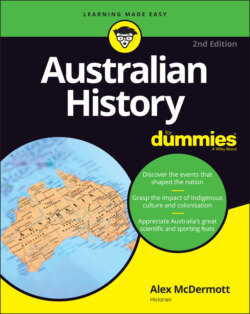Читать книгу Australian History For Dummies - Alex McDermott - Страница 46
THE ORIGINAL ODD COUPLE: COOK AND BANKS
ОглавлениеJames Cook and Joseph Banks were integral to the charting and settlement of Australia by Britain, but two more different men could not have been picked for the job.
James Cook was born in 1728. He grew up on a farm in rural Yorkshire and began his working life apprenticed to a grocer. Not finding that to be quite the adventure best suited to his mental horizons, however, Cook managed to get himself apprenticed instead to a coal-shipper who operated in the North Sea. From this, he graduated to the Royal Navy, picking up expertise in mathematics and navigation somewhere along the way.
By 30 he was serving in Canada during the Seven Years War with France. Thanks to his precision surveying in the St Lawrence River, the French city of Quebec was captured. After this he was given a bigger job — surveying Newfoundland, something he clearly enjoyed so much that getting married in 1762 delayed him only temporarily. He was soon back in the harness finishing the job (perhaps aligning wife Elizabeth with the Quebecois on the list of people he was rubbing the wrong way). His work in Newfoundland, however, was what got him noticed and meant he was selected as commander for the1768 scientific expedition to the South Seas.
Cook, it seems, was meticulous with everything he did, whether surveying and charting inlets and rivers, or ensuring his crew stuck rigorously to a new diet to avoid scurvy. He was a stickler with those beneath him — he flogged often (especially in his third and last expedition to the South Pacific) — but was trusted too.
Joseph Banks was born in 1743. His father a member of parliament, and young Joseph himself enjoyed Harrow, Eton and Oxford. The wildflowers at Eton (he later said) sparked an interest in botany — this interest certainly helps explain why such a bright lad did so lamentably badly at his study of Greek and Latin. On getting to Oxford, he was horrified to find that the university had no botanist on hand to tutor him, so he was allowed to bag one from Cambridge.
At 21, Joseph came into his inheritance (his father having died when Joseph was 18). Leaving Oxford without bothering to finish his degree, Banks didn’t do the usual thing expected at the time of a young gentlemen of large fortune (go on the ‘Grand Tour’ of Europe) but instead went off on a naturalist tour of Newfoundland and Labrador in North America. By curious coincidence, around the same time Cook was charting the coast of Newfoundland, Banks was amassing a huge collection of the island’s natural specimens.
Banks was knighted in 1781.
In 1768, the Royal Society (a learned society originally set up by Royal Charter a century before for the advancement of scientific knowledge, and of which Banks was a member) managed to persuade the British Admiralty to send an expedition to observe the transit of Venus on the Pacific Island of Tahiti (the weather forecast for England that year being overcast with rain).
By this time, Cook was a lieutenant in the Royal Navy and he was selected to command the expedition. The Royal Society suggested Banks, ‘Gentleman of large fortune … well versed in natural history’, along with his ‘suite’, could accompany Lieutenant Cook on the voyage. Banks’s suite was a cast of eight — naturalists, artists and servants — there to help him pick, pluck, catch and collect as many new zoological and botanical specimens as possible, and draw, describe and preserve them as well.
As well as observing the transit of Venus, however, the British Admiralty also gave Cook a set of secret instructions to follow: To establish once and for all if the ‘Unknown Southern Land’, or ‘Terra Australis Incognita’ was anything more than a pipe dream. If it was there, and Cook found it, he was told claiming it for Britain mightn’t be a bad idea.
